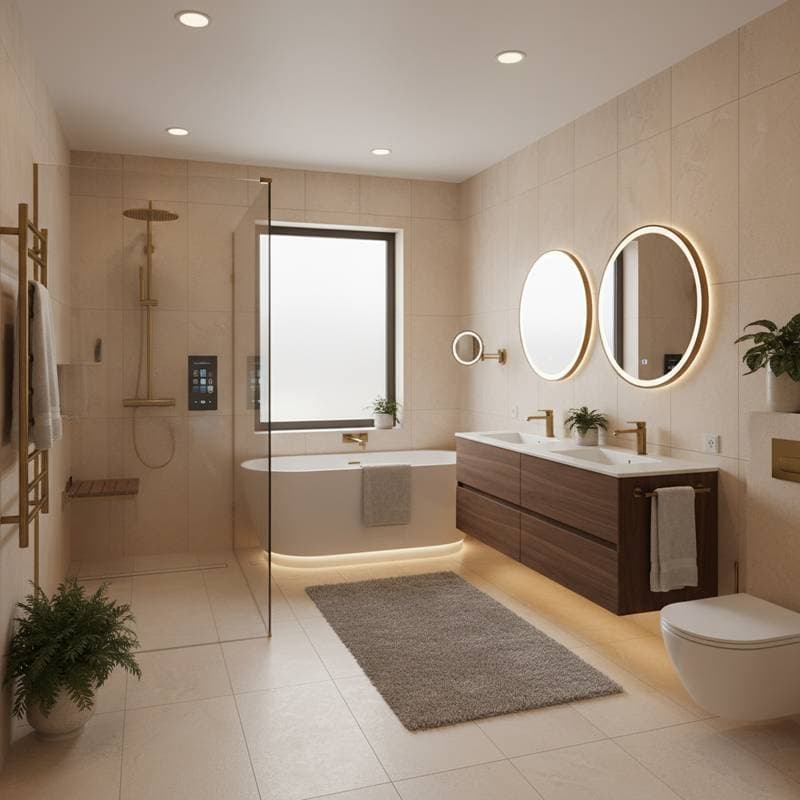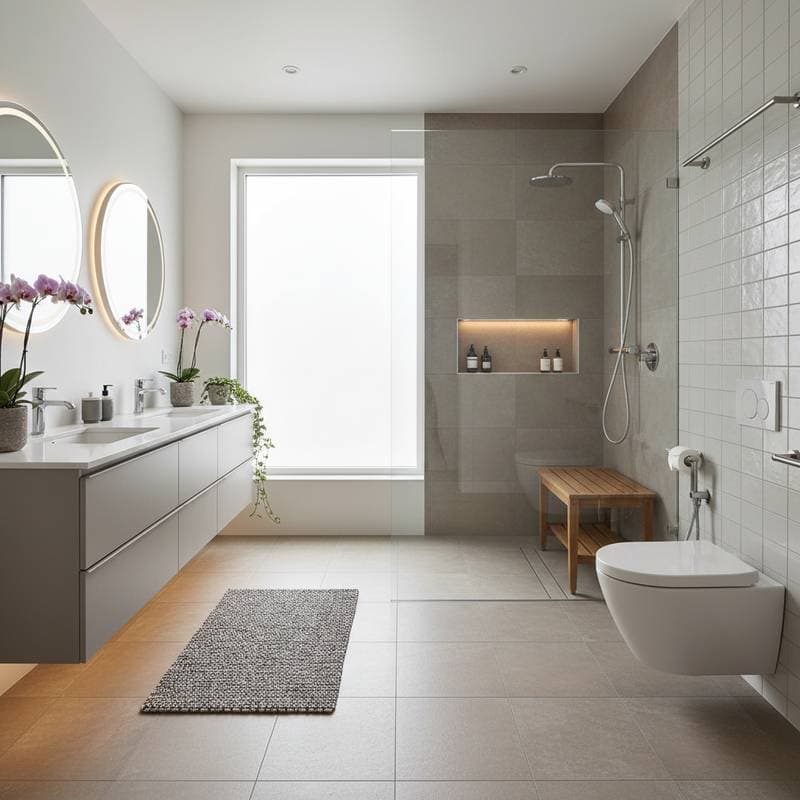The Japandi Wet Room Trend Defining 2025 Bathrooms
Bathroom design evolves toward tranquility and efficiency, with the Japandi wet room emerging as a leading influence. This style integrates the clean simplicity of Japanese aesthetics with the inviting warmth of Scandinavian elements, resulting in spaces that promote relaxation and practicality. Clean lines, natural textures, and open layouts transform ordinary bathrooms into personal retreats that align with modern lifestyles.
Professionals in interior design recognize Japandi wet rooms for their enduring appeal. These designs expand perceived space in compact areas and elevate larger ones to luxurious standards. Most importantly, implementation remains accessible across various budgets, allowing homeowners to incorporate elements gradually.
Understanding Wet Rooms
A wet room features a fully waterproofed floor and walls, eliminating the need for shower enclosures or curbs. Water flows freely across the level surface, draining through integrated systems for a seamless appearance. This configuration simplifies maintenance and enhances the sense of openness.
Wet rooms suit diverse spaces, from urban studios to spacious family homes. Effective waterproofing, such as membranes and sealants, ensures durability, while drainage solutions like linear grates maintain functionality. Options vary by investment level to accommodate different preferences.
- Affordable choice: Opt for vinyl sheets or laminates resembling natural stone, priced at approximately $3 to $5 per square foot, paired with basic silicone sealing.
- Moderate investment: Select microcement overlays or oversized porcelain tiles, ranging from $6 to $12 per square foot, for a refined finish.
- Premium selection: Install polished concrete, slate, or custom mosaic tiles, starting at $20 per square foot, to achieve sophisticated depth.
Strategic lighting and complementary fixtures elevate even entry-level materials, ensuring a cohesive and inviting result.
Aligning Wet Rooms with Japandi Principles
Japandi emphasizes equilibrium between form and function, a philosophy wet rooms embody through their fluid design. The absence of barriers fosters movement and reduces clutter, creating environments that feel both serene and efficient. This adaptability makes Japandi wet rooms suitable for varied living situations.
Accessibility stands out as a core benefit, with level floors supporting ease of use for all ages and abilities. No thresholds or steps align with Japandi's focus on inclusive, mindful design. Integrating subtle zoning, such as through material shifts or lighting, maintains the minimalist ethos while defining areas practically.
Practical Styling for Tranquil Spaces
Styling a Japandi wet room involves selecting elements that enhance calm without overwhelming the space. Focus on organic materials and subtle textures to build layers of interest. Personal touches, introduced sparingly, ensure the design reflects individual needs.
- Incorporate storage solutions like rattan baskets or stoneware vessels to conceal essentials while adding organic form.
- Introduce low-maintenance plants, such as snake plants or peace lilies, to infuse vitality and purify the air.
Select linens in muted palettes, like linen towels in beige or gray, for softness against the skin. Natural-fiber rugs or mats provide underfoot comfort without impeding drainage. For added ambiance, position diffused sconces or recessed lights to mimic natural daylight, highlighting textures gently.
Japandi thrives on imperfection, where visible grain in wood or subtle variations in tile add authenticity. Balance these details with consistent neutral tones, such as warm grays, soft taupes, and earthy whites, to sustain harmony.
Business Opportunities in Japandi Design
The rising popularity of Japandi wet rooms presents viable prospects for professionals in design and manufacturing. Consumers seek products that prioritize sustainability, modularity, and understated elegance, driving innovation in bathroom solutions. Entrepreneurs can capitalize by developing items that integrate seamlessly into this aesthetic.
Consider creating adjustable shelving units from reclaimed wood or non-toxic waterproof finishes derived from natural resins. Compact, hidden drainage kits appeal to renovation projects in tight spaces. Artisans might craft bespoke items, including hand-glazed sinks or woven storage hampers, emphasizing ethical sourcing.
This trend extends beyond aesthetics to promote longevity and environmental responsibility. Materials like FSC-certified timber or recycled glass resonate with eco-conscious buyers, fostering brand loyalty. Positioning offerings within Japandi's framework not only meets market demand but also supports scalable business growth.
Embracing Daily Serenity in Your Wet Room
The enduring value of a Japandi wet room reveals itself in routine use, where design influences mood and efficiency. Open layouts facilitate effortless transitions, turning morning preparations into meditative moments. Neutral palettes and tactile surfaces cultivate a soothing atmosphere that persists through the day.
Begin transformations incrementally to build confidence. Swap existing enclosures for frameless glass doors to introduce openness, or layer in wooden accents like a teak tray for toiletries. Updating wall colors to muted earth tones instantly shifts the room's energy.
Over time, these adjustments accumulate into a cohesive sanctuary. The result extends beyond visual appeal, fostering habits of mindfulness and simplicity. Invest in this design approach to elevate your home's core, yielding lasting comfort and joy.








